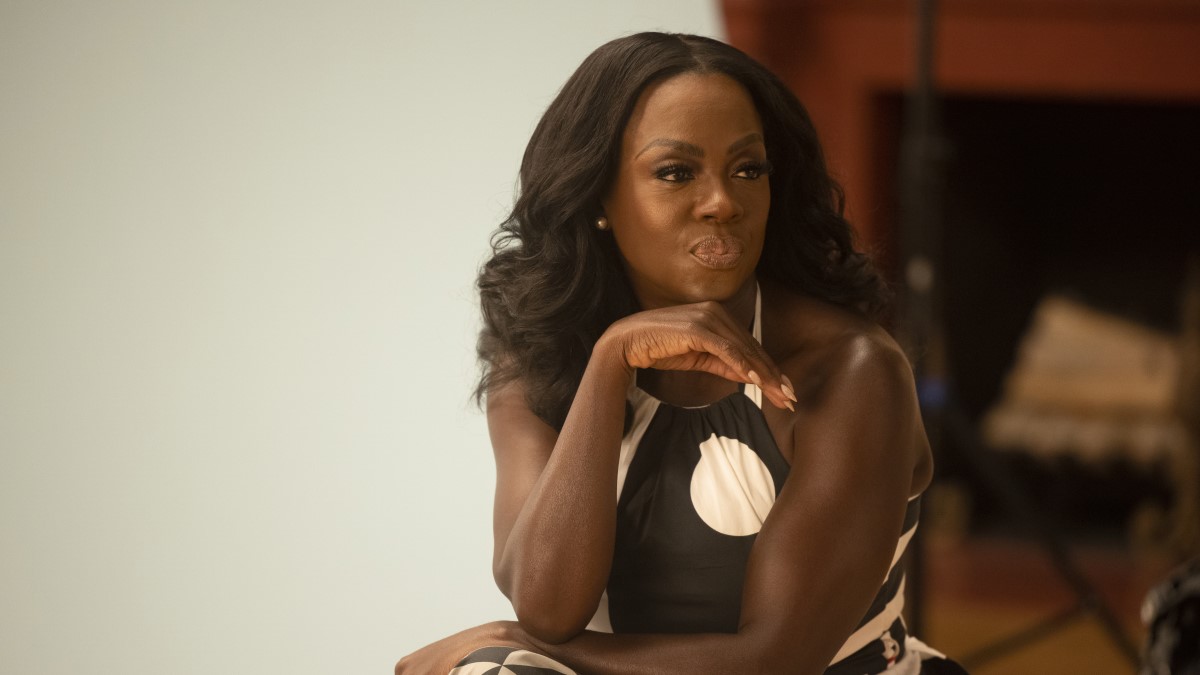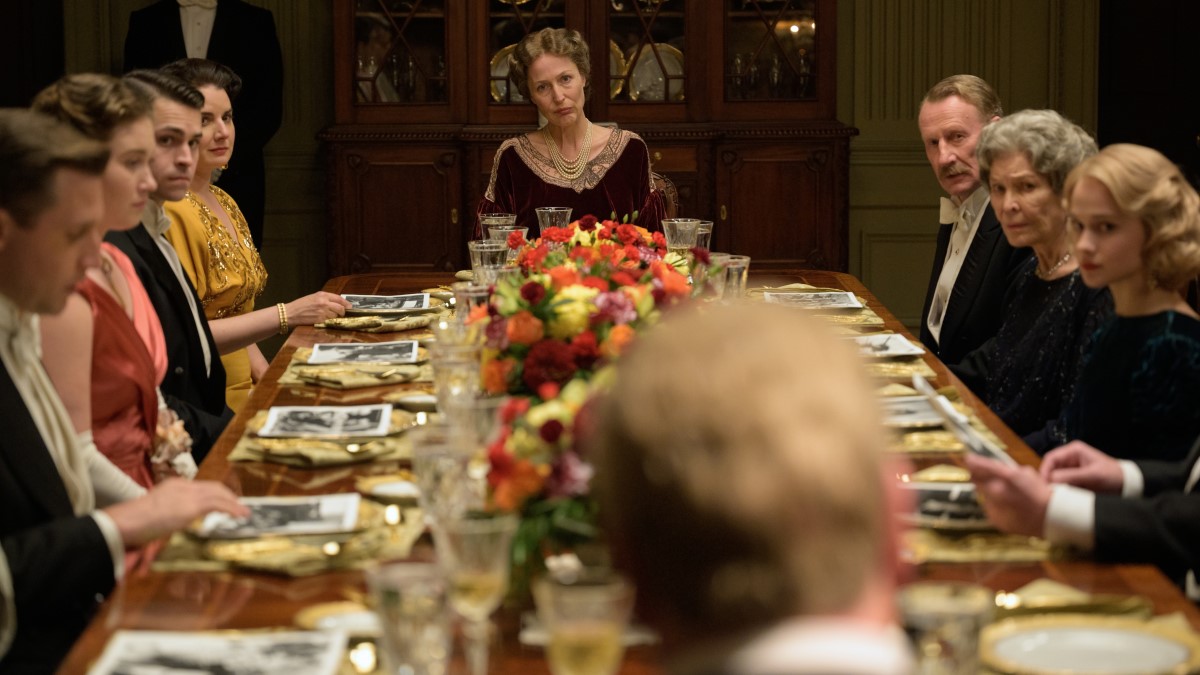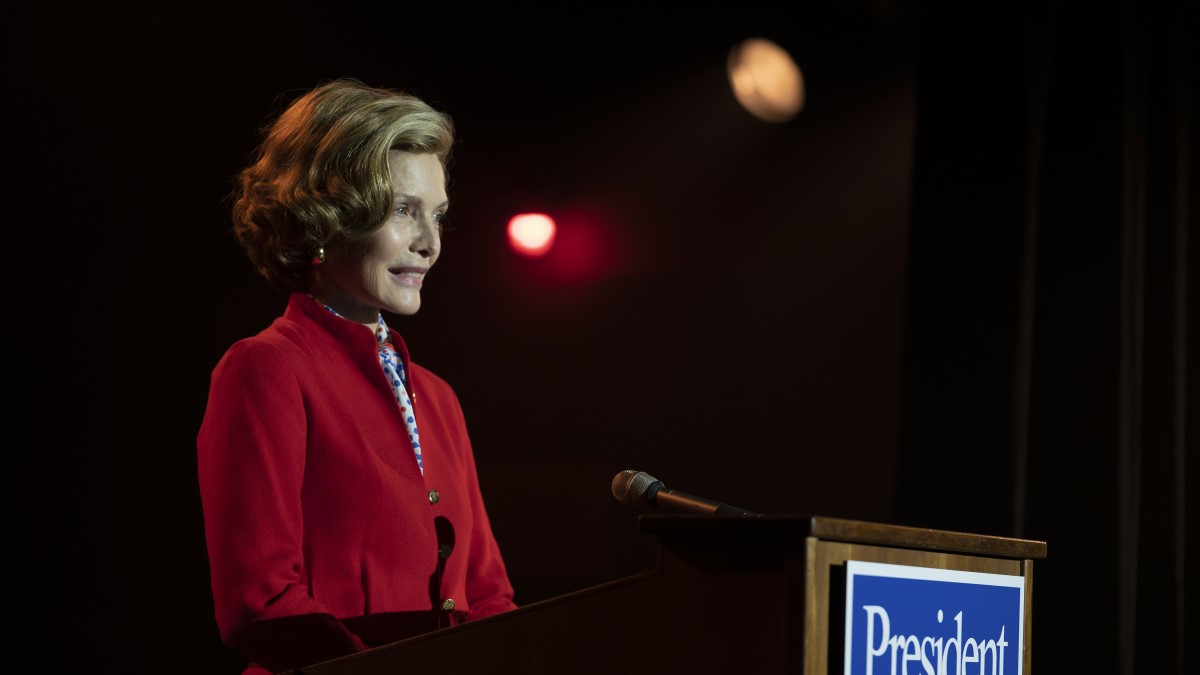What to Watch Verdict
Pacing issues remain, but Susanne Bier does a wonderful job of portraying moments that depict the singularity of each woman.
Pros
- +
Capturing Betty's barefoot table photograph
- +
Michelle's commencement speech
- +
The Sara Roosevelt deathbed conversation
- +
The Wiki searches it inspires
Cons
- -
The Betty/Susan dynamic is one of the strongest but it's not being utilized
- -
Franklin asks his daughter to set up a meeting with his mistress
NOTE: This post contains spoilers for The First Lady season 1, episode 8, “Punch Perfect.” Read our previous The First Lady season 1 episode 7 right here.
The ability to enact change in a fraught political landscape and build a legacy are big themes in The First Lady. Repeatedly, Eleanor Roosevelt (Gillian Anderson), Betty Ford (Michelle Pfeiffer) and Michelle Obama (Viola Davis) have tried to strive forward — in private and public — and have been met with resistance.
"Punch Perfect" once again portrays the mental gymnastics each woman has to perform not to rock the boat too much while not compromising their values. Much like the effectiveness of this series, the results are varied.
Bouncing around the timeline has a way of flattening elements. For instance, Betty’s tenure as First Lady is so brief compared to Eleanor and Michelle. The stain of Watergate is blamed for Gerry’s (Aaron Eckhart) loss to Jimmy Carter and news coverage also refers to the pardon the president gave Richard Nixon. That decision was guided by Gerry’s desire to shift the conversation, but the long-term impact is evident. Behind the scenes, Betty was furious Nixon didn’t face any real consequences. Now, she becomes the public mouthpiece of the family in defeat.
In the last episode, Betty’s slurring on TV was a cause for concern. As Betty gives the concession speech (because Gerry has lost his voice), the camera lingers on her daughter Susan’s (Dakota Fanning) worried expression. The bond between mother and daughter has been a highlight of the series, so it's disappointing that Susan is absent for the rest of the episode.
The official White House photographer captures the last days in office and Betty’s vivacious spirit is on display when she picks the location for these shots. Standing on the Cabinet Room table, a barefoot Betty in a green velvet suit offers a free-spirited farewell. Director Susanne Bier expertly portrays the actual image that highlights Betty’s singularity.
It isn’t until the end of "Punch Perfect" that Betty makes another appearance and her dream Palm Springs retirement is not the shared experience she imagined. Sure, her home is stunning, but Gerry is traveling as much as he did when he was in office and she takes to asking the assigned secret service agent for home decor advice.
The latest updates, reviews and unmissable series to watch and more!
Drinking alone is not much fun and when she goes to complain about the noise from her next-door neighbor, she instead finds people to party with at all hours of the day. The episode ends with a drunk Betty going from dancing in a glorious Pucci-looking gown to falling in her bedroom.
Betty voiced her discontent to her husband about his schedule without much impact, but Michelle is also pushing back (much like the series, I can make tenuous links between narratives). Last week’s conversation about gun control reflected how little has changed and now another all-too-timely story is in focus.

The episode opens with Michelle getting her hair done and her hairstylist suggests she rocks her "natural texture." Michelle (with straightened hair) watches a white woman mistakenly identify another Black woman as the first lady at the fundraiser. Even after all this time in the spotlight, Michelle experiences indignities and while she can ultimately let this one slide, there are conversations she refuses to ignore.
A distraught Malia (Lexi Underwood) comes to her mother after watching the news coverage of Philando Castile getting shot eight times in the back by a police officer. Malia wants to know why unarmed Black men are still being killed, but her mother doesn’t have the answers. When she brings this up to Barack (O-T Fagbenle), he is once again stuck in a game of political chess. Michelle has got to the point in this presidency where she wants to push back against daily racial injustices.
Scenes of teenage Michelle (Jayme Lawson) getting told by her school guidance counselor that she isn’t "quite Princeton material" (because she can’t get a sports scholarship) show the barriers and microaggressions Black students encounter. In the present, Tuskegee University invites Michelle to give the commencement speech, which she agrees to without consulting with the West Wing first — she knows they would deny this request. "You matter," Michelle tells the graduating class of 2015 (it is well worth watching the whole speech).
Tuskegee links the 21st and 20th century stories with the past by the airman Eleanor met in the episode 7. The clock has ticked forward to WWII, but it's 1940 and the US entry into this conflict is a year away. This doesn’t stop Eleanor from attempting to use her position to aid those in need, which includes Jewish refugees on the SS Quanza who are looking to dock in the US.
Journalist Martha Gellhorn Hemingway (Gwendolyn Ellis) appeals to Franklin (Kiefer Sutherland) about their plight and that returning to Europe is a death sentence. Franklin asserts that "my hands are tied," so he cannot step in, but this answer is not good enough for his wife.
Eleanor makes a point to show the faces of those they could save at a dinner with influential guests. The conversation moves onto frivolous topics after Eleanor is called out for making people feel uncomfortable. It's mind-boggling to watch this unfold and it's no wonder she cannot contain her frustration. Later, Eleanor does get the necessary visas; however, the dinner stunt means that no more refugees will be accepted.

While this situation plays out, there are a couple of personal updates, including a growing rift between Eleanor and Hick (Lily Rabe). They barely see each other and when they do Eleanor is preoccupied with the terrible state of the world. Meanwhile, Franklin tells his daughter to arrange a meeting with Lucy (Maria Dizzia) because he "needs something too." Yep, he asks Anna (Cailee Spaeny) to call his mistress.
The clock rolls forward to 1941, where on her deathbed, Franklin’s mother, Sara (Ellen Burstyn), offers Eleanor a rare compliment. The Roosevelts have a complicated family dynamic, but credit is given where it is due. Eleanor has the courage of her convictions and with just two episodes remaining, this notion of legacy remains in focus.
Watch The First Lady on Showtime in the US and in the UK you can now stream it on Paramount Plus.
Emma Fraser spends most of her time writing about TV, fashion, and costume design; Dana Scully is the reason she loves a pantsuit. Words can also be found at Vulture, Elle, Primetimer, Collider, Little White Lies, Observer, and Girls on Tops. Emma has a Master’s in Film and Television, started a (defunct) blog that mainly focused on Mad Men in 2010, and has been getting paid to write about TV since 2015. It goes back way further as she got her big start making observations in her diary about My So-Called Life’s Angela Chase (and her style) at 14.


